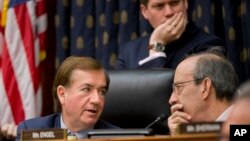Something very rare happened in the U.S. Congress this week: Republicans and Democrats agreed to support tough action on North Korea after a series of provocations by Pyongyang.
The House of Representatives passed broad new sanctions Friday against North Korea by a vote of 408 to 2. The Senate passed the sanctions bill earlier this week by a vote of 96-0, meaning that the measure now goes to President Barack Obama’s desk for signing.
The legislation directly targets money launderers, human rights abusers, weapons and luxury goods traders, and anyone involved with the nuclear weapons program or anyone who carries out cyber-attacks. It also would impose secondary sanctions against any outlets that support and finance North Korea’s aggression.
In addition, the bill would authorize $10 million annually for five years to expand North Korean citizens’ access to media and to provide humanitarian aid to refugees.
The legislation passed through both chambers of Congress at lightning speed, less than one week after North Korea launched a long-range rocket. A number of lawmakers expressed concern that the international community is not moving fast enough to counter Pyongyang’s dangerous nuclear program, which has the potential to threaten the United States and its allies.
White House officials indicate the president isn't likely to veto the bill due to its overwhelming Congressional support.
Punishing blow
House Foreign Affairs Committee Chairman Ed Royce sponsored the bill. The California Republican said its broad bipartisan support shows that many lawmakers are frustrated with the Obama administration’s policy of “strategic patience” with North Korea and are demanding a new approach.
Royce said the tough legislation is meant to deal such a punishing blow that North Korean leader Kim Jong Un is forced to make a choice between returning to the negotiating table and ending his country’s nuclear program or having funds for his regime cut off.
Some analysts draw parallels to the tough U.S. sanctions imposed on Iran, which many credit with forcing Tehran to the negotiating table and paving the way for the nuclear deal.
Experts, however, are divided over the question of how much impact the sanctions will have on such an extremely closed, isolated country with an underdeveloped economy.
'Human rights house of horrors'
Ranking Democratic member Eliot Engel said several different U.S. administrations, both Republican and Democratic, had tried in vain to curb North Korea’s nuclear ambitions. He said no one should blame any one president.
Engel also made clear that the United States is not angry with the people of North Korea, but with its corrupt leaders.
"I've been to North Korea twice, and it’s just sickening that the regime and its friends profit from these crimes while the rest of the country is literally starving," said Engel. "On that point, this bill includes important exceptions for the humanitarian aid that benefits the North Korean people."
Royce highlighted the human rights provisions in the legislation. “Equally important to the strong sanctions in this bill are its critical human rights provisions," he said. "North Korea operates a brutal system of gulags that hold as many as 120,000 men, women, and children.
"If a North Korean is suspected of any kind of dissenting opinion from the Kim regime, his entire family — for three generations — is punished," Royce added. "North Korea is a human rights house of horrors.”




